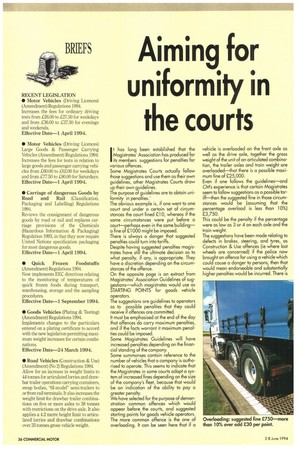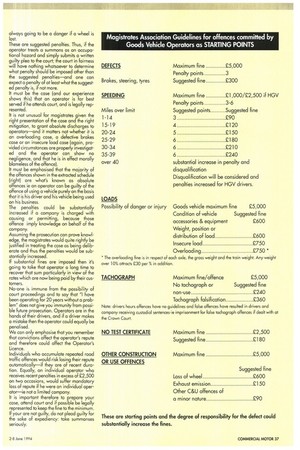Aiming for uniformity in the courts
Page 38

Page 39

If you've noticed an error in this article please click here to report it so we can fix it.
It has long been established that the Magistrates' Association has produced For its members suggestions for penalties For various offences.
Some Magistrates Courts actually Follow those suggestions and use them as their own guidelines, other Magistrates Courts draw up their own guidelines. The purpose of guidelines are to obtain uniformity in penalties.' The obvious example is, if one went to one court and under a certain set of circumstances the court Fined £10, whereas if the same circumstances were put before a court—oerhaps even in the same building— a fine o£1 000 might be imposed. There is always a danger that suggested penalties could turn into tariffs. Despite having suggested penalties magistrates have still the ultimate decision as to what penalty, if any, is appropriate. They have a discretion depending on the circumstances of the offence.
On the opposite page is an extract from Magistrates' Association Guidelines of suggestions—which magistrates would use as STARTING POINTS for goods vehicle operators. The suggestions are guidelines to operators as to possible penalties that they could receive if offences are committed, It must be emphasised at the end of the day that offences do carry maximum penalties, and if the facts warrant it maximum penalties could be imposed. Some Magistrates Guidelines will have increased penalties depending on the financial standing of the company.
Some summonses contain reference to the number of vehicles that a company is authorised to operate. This seems to indicate that the Magistrates in some courts adopt a system of increased fines depending on the size of the company's fleet, because that would be an indication of the ability to pay a greater penalty.
We have selected for the purpose of demonstration common offences which would appear before the courts, and suggested starting points for goods vehicle operators. The more common offence is the one of overloading. It can be seen here that if a vehicle is overloaded on the front axle as well as the drive axle, together the gross weight of the unit of an articulated combination, the trailer axles and train weight are overloaded—that there is a possible maximum fine of E25,000.
Even if one follows the guidelines—and CM's experience is that certain Magistrates seem to Follow suggestions as a possible tariff—then the suggested fine in those circumstances would be (assuming that the percentage overload is less than 10%) £3,750.
This could be the penalty if the percentage were as low as 3 or 4 on each axle and the train weight. The suggestions have been made relating to defects in brakes, steering, and tyres, as Construction & Use offences (ie where lost wheels are concerned) if the police now brought an offence for using a vehicle which could cause a danger to persons, then that would mean endorseable and substantially higher penalties would be incurred. There is always going to be a danger if a wheel is lost.
These are suggested penalties. Thus, if the operator treats a summons as an occupational hazard and simply submits a written guilty plea to the court; the court in fairness will have nothing whatsoever to determine what penalty should be imposed other than the suggested penalties—and one can expect a penally of at least what the suggested penalty is, if not more,
It must be the case (and our experience shows this) that an operator is far best served if he attends court, and is legally represented.
It is not unusual for magistrates given the right presentation of the case and the right mitigation, to grant absolute discharges to operators—and it matters not whether it is an overloading case, a defective brakes case or an insecure load case (again, provided circumstances are properly investigated and the operator can show no negligence, and that he is in effect morally blameless of the offence).
It must be emphasised that the majority of the offences shown in the extracted schedule (right) are what's known as absolute offences ie an operator can be guilty of the offence of using a vehicle purely on the basis that it is his driver and his vehicle being used on his business.
The penalties could be substantially increased if a company is charged with causing or permitting, because those offence imply knowledge on behalf of the company. Assuming the prosecution can prove knowledge, the magistrates would quite rightly be justified in treating the case as being deliberate and thus the penalties would be substantially increased. If substantial fines are imposed then it's going to take that operator a long time to recover that sum particularly in view of the rates which are now being paid by their customers.
No-one is immune from the possibility of court proceedings and to say that "I have been operating for 20 years without a problem" does not give you immunity from possible future prosecution. Operators are in the hands of their drivers, and if a driver makes a mistake then the operator could equally be penalised. We can only emphasise that you remember that convictions affect the operator's repute and therefore could affect the Operator's Licence.
Individuals who accumulate repeated road traffic offences would risk losing their repute automatically—if they are of recent duration. Equally, an individual operator who receives recent penalties in excess of £2,500 on two occasions, would suffer mandatory loss of repute if he were an individual operator—ie not a limited company. It is important therefore to prepare your case, attend court and if possible be legally represented to keep the fine to the minimum. If your are not guilty, do not plead guilty for the sake of expediency: take summonses seriously.
















































































